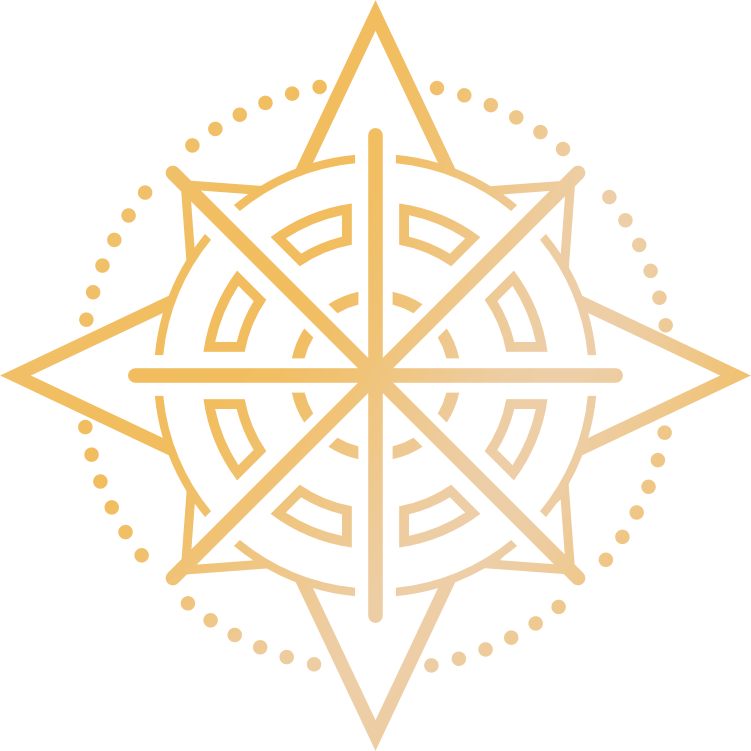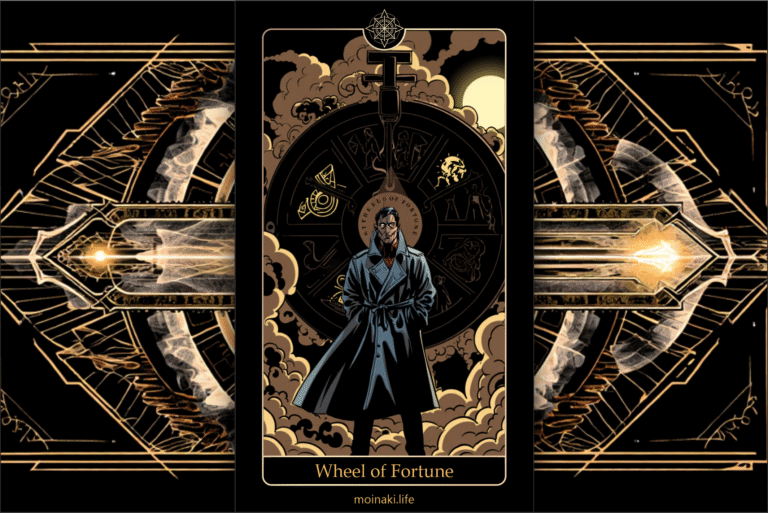Nine of Swords
The Nine of Swords is one of the most instantly recognizable cards in the tarot deck. It shows a figure sitting up in bed at night, head in hands, clearly anxious or distressed. This image captures a universal human experience: the sleepless night, when worries feel overwhelming and the mind can’t find peace. In modern psychological terms, it’s the card of anxiety, fear, and mental overload — but also the potential for healing and self-understanding.
Context and Classic Imagery of the Nine of Swords
In classic decks like the Rider-Waite-Smith, the Nine of Swords features a person awake at night, often appearing to cry or hold their head in despair. Nine swords hang on the wall behind them — a visual symbol of the many thoughts or burdens weighing on their mind. There’s a quilt with symbols, suggesting that even in comfort, the mind can be restless.
Everyone has nights like these — when the mind replays regrets, fears, or worries about the future. The Nine of Swords is not about what’s actually happening, but about how our thoughts and emotions can make things feel worse than they are.
Core Meanings: Upright and Reversed
Upright Nine of Swords
Keywords: Anxiety, worry, guilt, sleepless nights, overthinking, regret, inner turmoil.
When the Nine of Swords appears upright, it often signals that you’re dealing with intrusive thoughts, relentless self-criticism, or emotional pain. You may be catastrophizing — imagining the worst outcomes — or feeling stuck in a cycle of negative self-talk. This card can also relate to guilt or shame, especially about things that are out of your control, or that you can’t change in the present moment.
It’s important to note: the Nine of Swords rarely points to actual external dangers. Instead, it highlights your internal experience. You might be safe and supported, but your mind is running through all the things that could go wrong.
Reversed Nine of Swords
Keywords: Release of worry, facing fears, healing, denial, persistent anxiety, seeking support.
Reversed, the Nine of Swords can have several shades of meaning. Sometimes, it shows that you are beginning to let go of excessive worry or finding ways to manage anxiety. Other times, it may indicate that you’re avoiding dealing with your fears, or that anxiety is so deeply ingrained you barely notice it anymore.
This card reversed can be a sign that healing is possible, but only if you acknowledge the thoughts and emotions you’ve been pushing away. It can also be a gentle nudge to reach out for help or talk about what’s bothering you.
Psychological Perspective: The Nine of Swords in Modern Life
Understanding Your Inner Dialogue
The Nine of Swords is, at its core, about how our thoughts shape our emotional reality. In a psychological context, this card invites you to notice how much of your distress comes from your interpretation of events, rather than the events themselves.
*Are you replaying old mistakes in your mind?* *Are you harshly judging yourself for things you’d easily forgive in someone else?* *Are you predicting disaster, even when you have no evidence things will go wrong?* These patterns are common, but they’re not inevitable.
“You don’t have to believe everything you think.” — This is a powerful lesson of the Nine of Swords.
Self-Compassion as a Tool for Healing
The pain of the Nine of Swords is real, but so is your capacity to work through it. Practicing self-compassion — treating yourself with the same kindness you’d offer a friend — is a powerful antidote. Notice when you’re being hard on yourself. Pause. Ask: What would I say to someone I care about in this situation?
Often, the mind exaggerates threats and minimizes your strengths. Bring gentle awareness to these patterns. Mindfulness techniques can help you observe your thoughts, rather than getting lost in them.
Applying the Nine of Swords: Concrete Steps for Growth
Practical Exercises to Work with Nine of Swords Energy
- Journaling Your Worries: Before bed, write down what’s on your mind. This can help you externalize worries and notice which ones are within your control.
- Reality Check: For each fear or regret, ask yourself: “Is this happening now, or am I imagining it?” Bringing your attention to the present moment can reduce anxiety.
- Talk to Someone: Anxiety can be isolating. Share your thoughts with a trusted friend, therapist, or support group. Sometimes just saying things out loud can make them feel less overwhelming.
- Compassionate Self-Talk: Notice when you’re criticizing yourself. Try replacing “I always mess up” with “I’m doing my best, even when things are hard.”
- Grounding Exercise: Place your feet flat on the floor, take three slow breaths, and notice five things you can see, four you can touch, three you can hear, two you can smell, and one you can taste. This helps anchor you in the present.
In the Workplace
The Nine of Swords can show up when you’re worried about your performance, doubting your value, or fearing mistakes. Remember, everyone has moments of insecurity. Instead of hiding your concerns, try asking for feedback or clarifying expectations. Most of the time, your fears are harsher than reality.
In Relationships
This card can point to overthinking conversations, replaying arguments, or worrying you’ve hurt someone. Practice open communication. Assume good intentions in others, and don’t be afraid to apologize if you think you’ve made a mistake — but don’t dwell on it endlessly.
Mindfulness Prompt
Next time you notice your mind racing at night, put your hand on your heart and say, “This is hard, but I am safe right now. I can face this.”
Summary: The Nine of Swords as a Mirror
The Nine of Swords is not a sign that disaster is around the corner. It’s a gentle — if sometimes uncomfortable — invitation to notice how your mind can create its own storms. By bringing awareness, compassion, and practical tools to your inner world, you can find relief and even grow stronger from the experience.
Tarot is not fortune-telling — it’s a mirror for reflection and growth.

